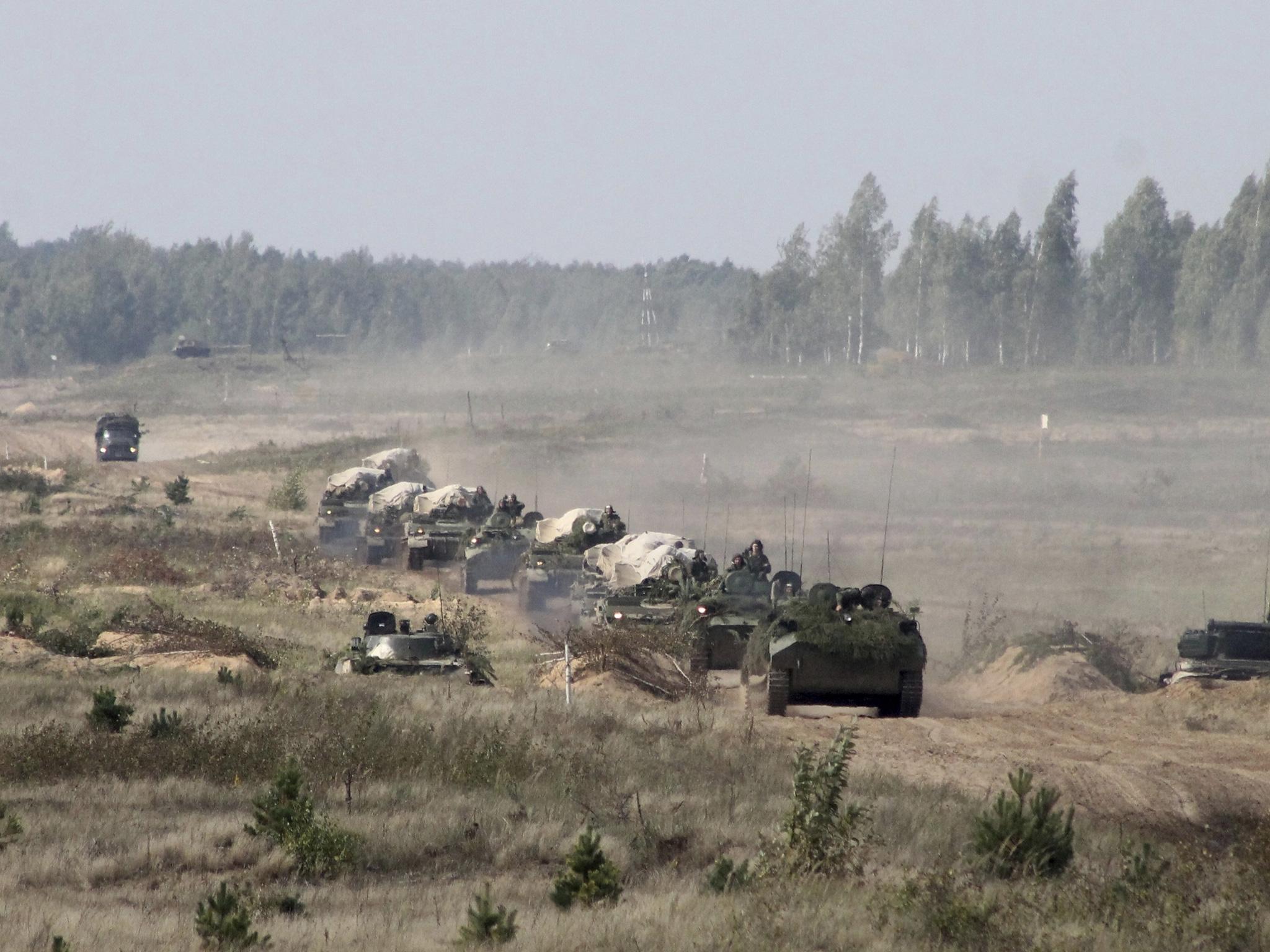Ukraine requests new weapons from US as Russia kicks off huge military exercise
‘With Moscow, one should always be prepared’

As thousands of Russian troops, aircraft and armour carried out massive war games across the border, Ukraine’s President was asking the US to supply advanced offensive weapons to defend itself against the “barbaric aggressive plans of the Kremlin”.
Petro Poroshenko had claimed that the military exercise, Zapad-2017, taking place in Belarus was really “a smokescreen to create new Russian army assault groups to invade Ukrainian territory”. The reality, he insisted, was that “with Moscow, one should always be prepared”, a lesson hard learned with the loss of Crimea and the civil war which had seen the east of the country effectively secede.
The newly appointed US special representative for Ukraine has stated that Washington is actively considering sending heavy weaponry to the Kiev government. Kurt Volker had said “defensive weapons, ones that would allow Ukraine to defend itself, and to take out tanks for example, would actually help. This is a matter for further discussion and decision: but I think that the argument that this would be provocative to Russia or emboldening of Ukraine is just getting it backwards.”
The sending of the arms would be a ratcheting up of America’s commitment to Ukraine in the country’s bitter confrontation with Russia. The prospect comes, ironically, during the administration of Donald Trump, who is under investigation for his alleged illicit links to Moscow, and someone who had said during the presidential election campaign that he would be prepared to accept the annexation of Crimea and suggested the possible lifting of sanctions imposed on Russia over Ukraine.
Mr Trump, however, was forced to approve fresh sanctions last month with overwhelming bipartisan support between Republicans and Democrats in Congress for the punitive measures. Speaking at the annual YES (Yalta Economic Strategy) summit in Kiev, Mr Poroshenko maintained it was vitally important for America and Western Europe to keep sanctions in place.
“Sanctions against Russia must be in force until full implementation of Minsk agreements [ceasefire deal] and restoring the sovereignty of Ukraine over Crimea and Donbas,” he said. “I would like to thank the United States for its leadership in strengthening sanctions against the aggressor. The price for aggression must keep rising. It must be unbearably hard to keep what was unlawfully taken, or, more bluntly, cynically stolen.”
Mr Poroshenko declared that the international conference would once again be held where it used to be, Yalta, before the Crimea passed under Russian control: “Regarding Crimea, we are being advised to put it off, to freeze it, or simply to forget about it. Only short-sighted politicians could give such advice, those who forget that today’s battle for the world order has started with occupation of the Crimea.”
Mr Trump is under pressure from some senior figures in his own Republican Party as well as military commanders to take a more combative stance towards Moscow over Ukraine. General Jack Keane, a former vice chief of staff in the US Army, held that the strategy being used by the Russian military in eastern Ukraine, including hybrid warfare and use of propaganda, was a “source of great concern and a great challenge to the US military”.
John Bolton, the hawkish former US ambassador to the United Nations, told the conference: “The reaction of the West to what the Russians have been doing has not been anything like strong enough. I don’t know whether the Trump administration will send effective military equipment to Ukraine, it is something I would have done years ago. What we will be seeing from Vladimir Putin is a lot of testing of the West, of the type we are seeing with these exercises in Belarus.”
Newt Gingrich, the former speaker of the US House of Representatives and a Trump supporter who has written a biography of the US President, accused President Putin of “breaking every norm of international relations decisively” and held there was a strong argument for supplying weapons to Kiev.
However, he held that “Russian aggression” was not sustainable. “It is costing them too much in every way, Russia will lose by exhaustion at the end. I think you will start to see some face-saving action as they are forced to retreat.”
It was left to former Secretary of State John Kerry to point out that Russia’s action may be the result, at least partly, of Western behaviour in the past. He recalled the “triumphalism” following the fall of the Berlin Wall and the failure to appreciate Moscow’s apprehension over the eastward expansion of Nato to Russia’s borders. Russia may also have felt hoodwinked over the Libyan conflict, he said, in which a UN resolution to protect civilians turned into a Nato bombing campaign against the Gaddafi regime.
There has to be a process of dialogue, said Mr Kerry, “otherwise there is a danger we will find ourselves pushed more and more into a corner”.
Join our commenting forum
Join thought-provoking conversations, follow other Independent readers and see their replies
Comments
Bookmark popover
Removed from bookmarks